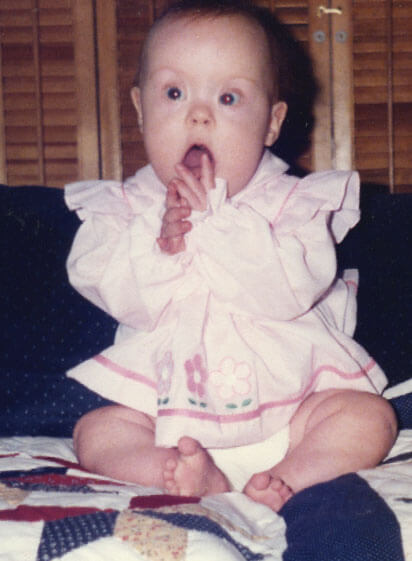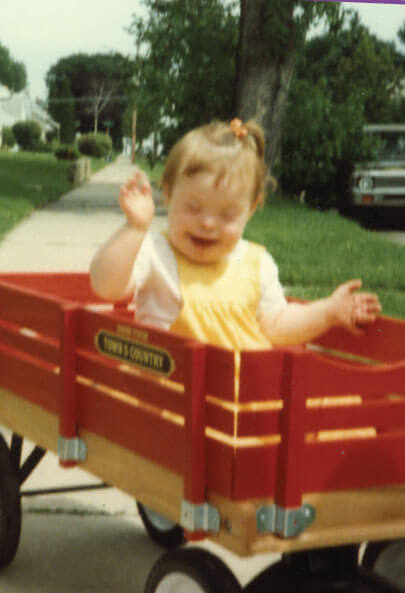by Nancy Jo Sullivan

Fifteen years ago I often asked the question, Why does God allow suffering? I had just become a new mother, but my baby daughter was sick, very sick. Not only did she have Down’s syndrome but the doctors had discovered a serious heart defect. Six weeks after Sarah’s birth she had surgery, and for days my husband and I kept vigil by her bedside in intensive care.
Behind swinging steel doors marked in red letters Sterilized Area, our baby lay in a corner crib. Huddling over her bed, we held her tiny hands and listened to the beat of her heart as thin jagged lines on the monitor above etched her progress. Nurses adjusted her breathing tubes and changed her bandages while doctors murmured softly and wrote notes on clipboards. They said her prognosis was grim.
Sometimes it was all too much, and I needed to get away from the sterile syringes and the pulsing of electrocardiographs. Each day I slipped down the hall to a lobby lined with chairs. There I turned the pages of outdated magazines or watched talk shows as I chewed on leathery apples from the vending machine.
Other parents sat there, too, parents like us, parents whose children suffered from heart disease or cancer or ailments so rare I had never heard of them. As I listened to their stories, I wondered how God could allow such disappointment and pain.
Then one day a new face arrived, a tall bearded man holding the hand of his five-year-old son. He wore the distinctive dark clothing of an Orthodox Jew: a tall dark hat with a brim, a long coal-colored coat with tails, and black tapered trousers. Curious, I watched as he placed a shawl and a small black prayer book on his son’s lap. Then he looked up and gave me a quick nod in greeting.
His name was Shimon. A rabbi, he had flown in from Boston that morning and would be staying with a nearby Jewish community. His son needed a new kidney. As the days passed, Shimon turned that lobby into a sort of living room. He set a gold-framed picture of his family on a table next to the vending machine. Each day he offered me kosher food from a paper bag: fresh-baked bread, red grapes, seasoned fish. And every morning he put on the shawl and his yarmulke; then with his prayer book opened he recited several Hebrew prayers in a soft voice.
Whenever he prayed I watched something amazing. One by one, each parent turned away from magazines and candy bars and talk shows. Together we bowed our heads. I don’t think any of us knew or fully understood his prayers. Most of us had come from Christian traditions, yet each of us felt a certain strength, a quiet comfort as he prayed.
In between those prayers and the breaking of bread, Shimon and I made conversation. We talked of the cold Midwestern winters, the ocean breezes in Boston, our families, and God. He spoke of the great I Am, an inextinguishable fire that led his people out of darkness, a brilliant flame that blazed in times of uncertainty. He was at peace with God. I, on the other hand, was not.
Then early on Sunday morning, Sarah took a turn for the worse. The doctors discovered a staph infection in her blood. It could take her life. My husband and I stood vigil by her crib. She lay almost lifeless, her small body bruised from weeks of incisions, needles, and stitches. Like the other children in that ward, she had battled more disease in a few short weeks than most people do in a lifetime.
As I held her tiny ashen hand, I retreated to a dark, despairing place where the light of faith is snuffed out and God’s absence seems real. Then I made my way to the lobby and buried my head in my hands.
“Can I help you?” I heard the rabbi ask.
After a long silence, I finally looked up. “Shimon,” I asked, “why does God allow such great suffering?”
For a moment Shimon bowed his head. Then he turned to me and said something I will never forget. “I do not know much about the God you hold in your heart,” he began, “except that he suffered and died on a cross. Perhaps it is your suffering God who draws near to you now.”
As he spoke, images of Calvary began to fill my mind: the somber sky, the nails of iron, the cross itself. In my mind I drew near to that cross. I could feel a wounded Christ wrap his injured arms around me, my sick baby, my husband, Shimon, and every parent in that lobby. An anguished God aching with the anguish of these children.
Soon a warmth began to fill me. It started out as an ember of hope, then became a blaze of faith. God was present. I knew it. I felt it.
Three days later Sarah recovered from the infection that had threatened her life. With suitcases packed to leave the hospital, we passed through the lobby one last time. Cradling my baby, I searched for Shimon to say goodbye. He wasn’t there. Some of the other parents happily reported that a kidney had been found for Shimon’s son, so Shimon would wait close to the operating room all day.
I scrawled a quick thank-you on the back of a candy box and tucked it underneath his family picture.
It’s hard to believe that more than a decade has passed. Now Sarah is fifteen years old, and I find myself recalling the rabbi who reminded me of what was at the heart of my own faith. My God does not abandon us in times of suffering. Jesus is there because he has been through suffering himself.



